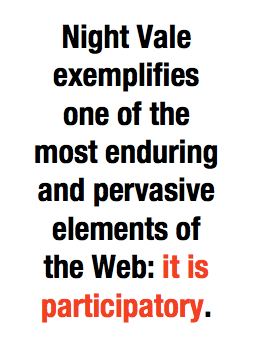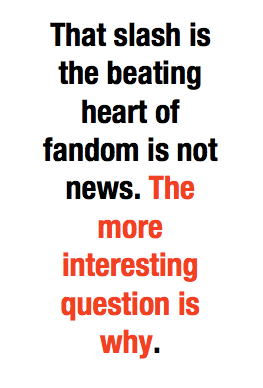Over the last few months, online fan communities have been caught up in the tornado of a new fandom: Night Vale.
First of all, Night Vale is remarkable because its origin is pure Internet. Though there are certainly other pure Internet sources of fandom, most source materials are TV shows or published books or other mass media forms.
Night Vale fandom, by contrast, comes from a podcast: Welcome to Night Vale (WTNV). The very fact that a podcast is popular is in itself remarkable. So popular, in fact, that WTNV has beat long-time number one podcast This American Life to become the single most popular podcast.
 WTNV is ostensibly an NPR-like program, with each episode bringing citizens the news out of Night Vale, a small desert town. And it’s a strange place. One of the candidates for mayor is an insurance agent and five-headed dragon. Forests appear overnight, the town is surveilled by unknown “hooded figures,” and half the denizens have left their bodies to become vaporous beings. It’s all very Twilight Zone.
WTNV is ostensibly an NPR-like program, with each episode bringing citizens the news out of Night Vale, a small desert town. And it’s a strange place. One of the candidates for mayor is an insurance agent and five-headed dragon. Forests appear overnight, the town is surveilled by unknown “hooded figures,” and half the denizens have left their bodies to become vaporous beings. It’s all very Twilight Zone.
But… a podcast!?!
Even without the fandom, WTNV shows off exactly what is so exciting about the Internet. The vanguard of art and entertainment is moving online. Soho has gotten too expensive for artists, so they’re moving to the Internet.
…
Regardless of the innovation of WTNV itself, the podcast has generated a rich new fandom seemingly overnight.
At least part of this following comes down to the fact that at the center of the story is a unfulfilled gay romance. Obviously the relationship has to be unfulfilled because, well, in the marriage plot, the couple rides off into the sunset at the end of the story. But there’s something especially wistful about Cecil’s crush on Carlos from afar. It taps into the frustrated teenager in all of us—in love as if our lives depended on it, but too unsure of ourselves to ask for the prom date.
In that way it’s not an original setup, I suppose. But it’s pitched perfectly to fandom because that setup is between two men (or males, anyway—Night Vale doesn’t specify whether the characters are human).
 What would fandom be without slash? Fandom’s focus, it seems, is often in supplying a gay romance to every story. Certainly when the story caters to it (Teen Wolf, anyone?), it only serves to fan the flames.
What would fandom be without slash? Fandom’s focus, it seems, is often in supplying a gay romance to every story. Certainly when the story caters to it (Teen Wolf, anyone?), it only serves to fan the flames.
That slash is the beating heart of fandom is not news. The more interesting question is why.
Here’s what I can gather, although I hasten to add I’m not too much a part of fandom myself. Partly it’s because it makes the same old stories feel fresh and new. Partly it’s for the same simple reason that straight men have always been obsessed with lesbian porn.
I think there’s also little bit more to it. For people who support gay rights, it makes a love story into something more: a social cause. Now it’s not just art or entertainment for the sake of itself, it’s also changing the world—two boys kissing at a time.
…
Despite the fact that there’s a gay romance at the heart of the story, the fandom inspired by Night Vale is oddly nostalgic. For all that the show features time travel and has no visual design of its own, the fanart tends toward a kind of 1950s-era propaganda and futurism. It feels a bit like the World of Tomorrow at Disneyland.
 I think that’s another big part of why it has resonated so much online. Though the Internet’s new frontier is built on technology, it is highly nostalgic—nostalgic perhaps because of its new frontier-ness. We are picking up and moving, but we want to take as much of our past with us as we can.
I think that’s another big part of why it has resonated so much online. Though the Internet’s new frontier is built on technology, it is highly nostalgic—nostalgic perhaps because of its new frontier-ness. We are picking up and moving, but we want to take as much of our past with us as we can.
And maybe we even want to make the past a little better than it ever was—hence the 1950s world, plus gay romance and time travel. The ’50s as we wish they’d been: Mayberry without the sexism, homophobia, and racism. Oh, and better technology.
Even the medium plays into the nostalgia—it’s successful not in spite of the fact that it’s a podcast, but because of it. The audio-only format makes it feel like we’re huddled around our Zenith, listening to War of the Worlds. And it plays well to fandom because of those same limitations. They leave a lot of room for the reader’s imagination.
***
Night Vale exemplifies one of the most enduring and pervasive elements of the Web: it is participatory. That goes for our art, our entertainment, our news—everything. When it’s online, expect to get involved in it. We make it our own.
Since the beginning of human history, there have been two models of art and entertainment: one passive—think the Roman Catholic Church—and one participatory—think of Homer or Shakespeare, each part of a culture obsessed with telling and retelling the same old, beloved, and well known stories. The game was who could tell it best.
The Iliad is a tough read today because we’re not in on the game any more. Homer’s audience knew the story backward and forward; we don’t. To us, Homer’s story of the sack of Troy reads as repetitive and perhaps self-indulgent. But to his audience, it was the iterative savoring and wallowing, the endless remaking and remixing—the play—of a fan.
For the past century or more, broadcasting has made the passive mode ascendant. The Internet is changing all that. At the moment, society at large may have a leftover contempt for the participatory mode; a veneration for the original masterpiece. But all you fan artists don’t—and shouldn’t listen—to that nonsense. You’re in some pretty great company.
Illustration via musain/Tumblr


